Ditapis dengan
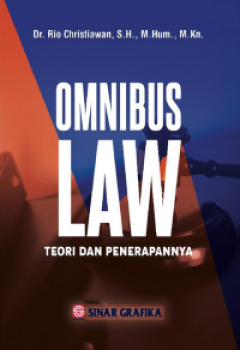
Omnibus Law: Teori dan Penerapannya
Buku Omnibus Law (Teori dan Penerapannya) ini berisi latar belakang pembentukan omnibus law di Indonesia, khususnya pembentukan omnibus law pada masa setelah orde Reformasi. Buku ini juga mengulas dampak banyaknya peraturan perundang-undangan yang berlaku sejak masa penjajahan Belanda dan ketika Indonesia merdeka pada tahun 1945. Salah satu aturan yang ada yaitu berdasarkan Pasal 2 Aturan Peral…
- Edisi
- -
- ISBN/ISSN
- 978-979-007-920-5
- Deskripsi Fisik
- xvi, 216 hlm.: ilus.; 21 cm.
- Judul Seri
- -
- No. Panggil
- 340.3 Chr o
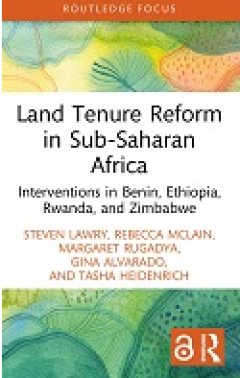
Land Tenure Reform in Sub-Saharan Africa: Interventions in Benin, Ethiopia, R…
This book examines the impacts of land tenure reform interventions implemented in Benin, Ethiopia, Rwanda, and Zimbabwe. Since 2000, many African countries have introduced programs aimed at providing smallholder farmers with low-cost certificates for land held under customary tenure. Yet there are many contending views and debates on the impact of these land policies and this book reveals how t…
- Edisi
- -
- ISBN/ISSN
- 978-1-003-36567-9
- Deskripsi Fisik
- 127 hlm.
- Judul Seri
- -
- No. Panggil
- -
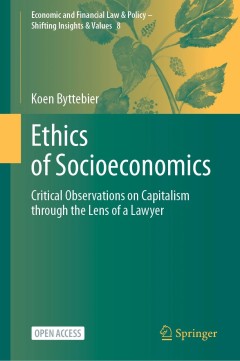
Ethics of Socioeconomics : Critical Observations on Capitalism through the Le…
The book analyzes socioeconomic through the lens of a lawyer. In the past decade the world has witnessed some severe financial and economic crises, especially the financial crisis of 2007-2008 and the crisis caused by the COVID-19 pandemic. The author states that the socio-economic order has in the past four to five decades been thoroughly redesigned, generally favouring models that priorit…
- Edisi
- -
- ISBN/ISSN
- 978-3-031-38837-8
- Deskripsi Fisik
- XXI, 452 p
- Judul Seri
- -
- No. Panggil
- -
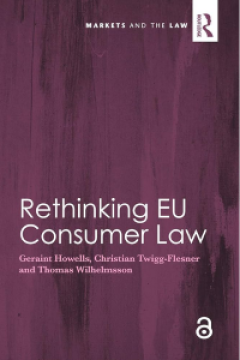
Rethinking EU Consumer Law
In Rethinking EU Consumer Law, the authors analyse the development of EU consumer law on the basis of a number of clear themes, which are then traced through specific areas. Recurring themes include the artificiality of the EU’s consumer image, the problems created by the drive towards maximum harmonisation, and the unexpected effects EU Consumer Law has had on national law. The book argues t…
- Edisi
- -
- ISBN/ISSN
- 978-1-315-16483-0
- Deskripsi Fisik
- 358 hlm.
- Judul Seri
- -
- No. Panggil
- -
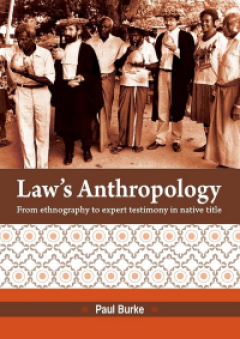
Law's Anthropology: From Ethnography to Expert Testimony in Native Title
Anthropologists have been appearing as key expert witnesses in native title claims for over 20 years. Until now, however, there has been no theoretically-informed, detailed investigation of how the expert testimony of anthropologists is formed and how it is received by judges. This book examines the structure and habitus of both the field of anthropology and the juridical field and how they hav…
- Edisi
- -
- ISBN/ISSN
- 978-1921862427
- Deskripsi Fisik
- 336 hlm.
- Judul Seri
- -
- No. Panggil
- -
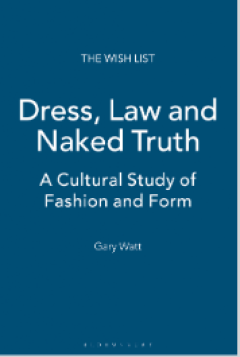
Dress, Law and Naked Truth: A Cultural Study of Fashion and Form
Why are civil authorities in so-called liberal democracies affronted by public nudity and the Islamic full-face ‘veil’? Why is law and civil order so closely associated with robes, gowns, suits, wigs and uniforms? Why is law so concerned with the ‘evident’ and the need for justice to be ‘seen’ to be done? Why do we dress and obey dress codes at all? In this, the first ever study dev…
- Edisi
- -
- ISBN/ISSN
- 978-1-4725-0045-8
- Deskripsi Fisik
- 193 hlm.
- Judul Seri
- -
- No. Panggil
- -

Diaspora, Law and Literature
The well-known challenges of international migration have triggered new departures in academic approaches, with 'diaspora studies' evolving as an interdisciplinary and even transdisciplinary field of study. Its emerging methodology shares concerns with another interdisciplinary field, the study of the relations between law and literature, which focuses on the ways in which the two cultural prac…
- Edisi
- -
- ISBN/ISSN
- 978-3-11-048925-5
- Deskripsi Fisik
- 368 hlm.
- Judul Seri
- -
- No. Panggil
- -
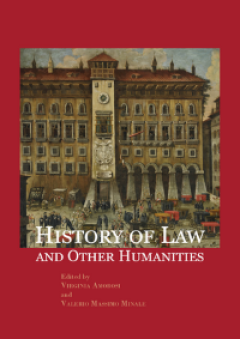
History of Law and Other Humanities: Views of the Legal World Across the Time
The collection of thirty-five essays presented here examines the links forged through the ages between the realm of law and the expressions of the humanistic culture. The essays are organized into sections of ten chapters based around ten different themes. Two main perspectives emerged: in some articles the topic relates to the conventional approach of ‘law and/in humanities’ (iconography, …
- Edisi
- -
- ISBN/ISSN
- 978-84-1324-239-2
- Deskripsi Fisik
- 594 hlm.
- Judul Seri
- -
- No. Panggil
- -
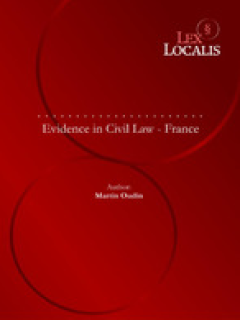
Evidence in Civil Law - France
The French Law of evidence is at the crossroad between procedural law and civil law. As part of the procedural law, it is governed by general principles set out by the Code de procédure civile, such as the contradictory principle, the principle of public hearing or the free disposition principle, which means that the parties define the framework of the proceeding and that the judge cannot base…
- Edisi
- -
- ISBN/ISSN
- 978-961-6842-48-8
- Deskripsi Fisik
- 67 hlm.
- Judul Seri
- -
- No. Panggil
- -

Law, Liberty, And The Pursuit Of Terrorism
It is commonly believed that a state facing a terrorist threat responds with severe legislation that compromises civil liberties in favour of national security. Roger Douglas compares responses to terrorism by five liberal democracies— the United States, the United Kingdom, Canada, Australia, and New Zealand— over the past 15 years. He examines each nation’s development and implementation…
- Edisi
- -
- ISBN/ISSN
- 978-0-472-02966-2
- Deskripsi Fisik
- 337 hlm.
- Judul Seri
- -
- No. Panggil
- -
 Karya Umum
Karya Umum  Filsafat
Filsafat  Agama
Agama  Ilmu-ilmu Sosial
Ilmu-ilmu Sosial  Bahasa
Bahasa  Ilmu-ilmu Murni
Ilmu-ilmu Murni  Ilmu-ilmu Terapan
Ilmu-ilmu Terapan  Kesenian, Hiburan, dan Olahraga
Kesenian, Hiburan, dan Olahraga  Kesusastraan
Kesusastraan  Geografi dan Sejarah
Geografi dan Sejarah